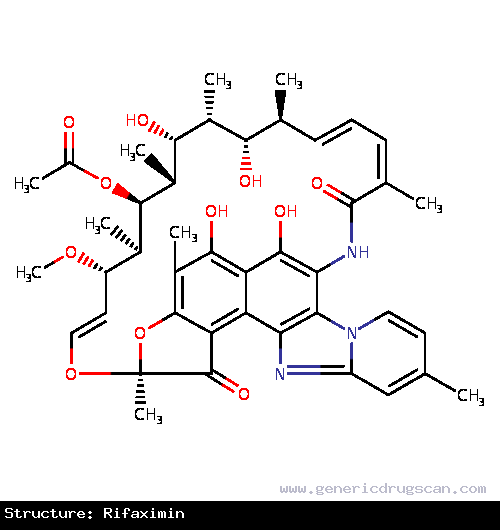Rifaximin Drug: Indication, Dosage, Precaution, Side Effect , Storage, Category Type and corresponding Brands - www.genericdrugscan.com
Rifaximin
Drug Status in USA : ApprovedDrug Status in Canada : Approved
pronunciation
pronounced as (ri fax' I men)
Why is this medication prescribed?
Rifaximin 200-mg tablets are used to treat traveler's diarrhea caused by certain bacteria in adults and children at least 12 years of age. Rifaximin 550-mg tablets are used to prevent episodes of hepatic encephalopathy (changes in thinking, behavior, and personality caused by a build-up of toxins in the brain in people who have liver disease) in adults who have liver disease and to treat irritable bowel syndrome (with diarrhea) in adults. Rifaximin is in a class of medications called antibiotics. Rifaximin treats traveler's diarrhea and irritable bowel syndrome by stopping the growth of the bacteria that cause diarrhea. Rifaximin treats hepatic encephalopathy by stopping the growth of bacteria that produce toxins and that may worsen liver disease. Rifaximin will not work to treat traveler's diarrhea that is bloody or occurs with fever.
Antibiotics such as rifaximin will not work for colds, flu, or other viral infections. Taking antibiotics when they are not needed increases your risk of getting an infection later that resists antibiotic treatment.
How should this medicine be used?
Rifaximin comes as a tablet to take by mouth with or without food. When rifaximin is used to treat traveler's diarrhea, it is usually taken three times a day for 3 days. When rifaximin is used to prevent episodes of hepatic encephalopathy, it is usually taken twice a day. When rifaximin is used to treat irritable bowel syndrome, it is usually taken three times a day for 14 days. To help you remember to take rifaximin, take it around the same times every day. Follow the directions on your prescription label carefully, and ask your doctor or pharmacist to explain any part you do not understand. Take rifaximin exactly as directed. Do not take more or less of it or take it more often than prescribed by your doctor.
If you are taking rifaximin to treat traveler's diarrhea, your symptoms should improve within 24 to 48 hours after you start taking the medication. If your symptoms do not go away or they get worse, or if you develop a fever or bloody diarrhea, call your doctor.
If you are taking rifamaxin to treat irritable bowel syndrome and your symptoms return after you have finished your treatment, call your doctor.
Take rifaximin as directed, even if you feel better. If you are taking rifaximin to treat traveler's diarrhea or irritable bowel syndrome and you stop taking it too soon or if you skip doses, your infection may not be completely cured and the bacteria may become resistant to antibiotics. If you are taking rifaximin to prevent hepatic encephalopathy, do not stop taking it without talking to your doctor as you may experience symptoms of encephalopathy.
What are the precautions to be followed?
Before taking rifaximin,- tell your doctor and pharmacist if you are allergic to rifaximin, rifabutin (Mycobutin), rifampin (Rifadin, Rifamate, Rifater, Rimactane), rifapentine (Priftin), any other medications, or any of the ingredients in rifaximin capsules. Ask your doctor or pharmacist for a list of the ingredients.
- tell your doctor and pharmacist what other prescription and nonprescription medications, vitamins, nutritional supplements, and herbal products you are taking or have recently taken. Be sure to mention cyclosporine (Gengraf, Neoral, Restasis, Sandimmune) or other antibiotics. Your doctor may have to change the doses of your medications, monitor you carefully for side effects or treat your diarrhea differently.
- tell your doctor if you have or have ever had liver disease.
- tell your doctor if you are pregnant, plan to become pregnant, or are breastfeeding. If you become pregnant while taking rifaximin, call your doctor.
What are possible side effects of this medication ?
Rifaximin may cause side effects. Tell your doctor if any of these symptoms are severe or do not go away:nauseastomach paindizzinessexcessive tirednessheadachemuscle tighteningjoint painSome side effects can be serious. If you experience any of the following symptoms, call your doctor immediately:
watery or bloody diarrhea that may occur along with stomach cramps and fever during your treatment or for 2 months afterwardhivesrashitchingdifficulty breathing or swallowingswelling of the face, throat, tongue, lips, eyes, hands, feet, ankles, or lower legshoarseness
Rifaximin may cause other side effects. Call your doctor if you have any unusual problems while taking this medication.
How to store the medication and dispose it of after its use later?
Keep this medication in the container it came in, tightly closed, and out of reach of children. Store it at room temperature and away from excess heat and moisture (not in the bathroom).
Unneeded medications should be disposed of in special ways to ensure that pets, children, and other people cannot consume them. However, you should not flush this medication down the toilet. Instead, the best way to dispose of your medication is through a medicine take-back program.
Drug Category/Class
- Gastrointestinal Agents
- Nucleic Acid Synthesis Inhibitors
- Anti-Infective Agents
- Genito Urinary System and Sex Hormones
- Antibacterials for Intramammary Use
- Antidiarrheals, Intestinal Anti-Inflammatory
- antiinfective Agents
- Antibiotics for Topical Use
- Antiinfectives and Antiseptics for Intrauterine Use
- Intestinal Antiinfectives
- Antibacterials
- Dermatologicals
- Antibiotics
- Alimen
| Prescribed | Rifaximin has multiple indications by the FDA: for the treatment of patients (?12 years of age) with traveller's diarrhea caused by noninvasive str... |
| Weight : | 785.8785 |
| Structure | Rifaximin |
 | |
| Formula | C43H51N3O11 |
Rifaximin has 7 Brands listed
| Rcifax (200 mg) | Rcifax (400 mg) |
| Rifagut (200 mg) | Rifagut (400 mg) |
| Rifagut (550 mg) | Rixmin (400 mg) |
| Torfix (200 mg) |
Search Generic Drugs alphabetically
